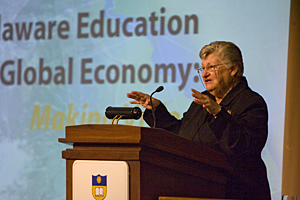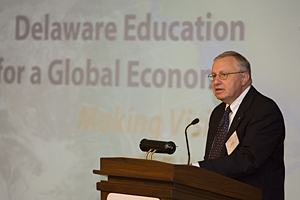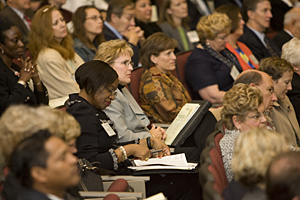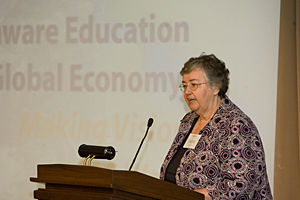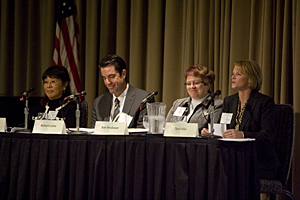- Click here to view slideshow.
- 3rd Partnership Conference focuses on education for a global economy
- British expert urges U.S. to push ahead with education reforms
- Early childhood education declared an essential foundation
- Keeping stride globally should be goal No. 1, Vision 2015 panelists say
- Schoenhals calls for major reforms in public education
Click here to view or download a video of this conference session.
Editor's note: To download either of the two videos shown at this conference session--"View from the Skate Park" or "Vision Network Highlights"--click here.
4:49 p.m., Oct. 3, 2008----Transforming Delaware's public schools into world-class institutions that prepare every student to participate in the global economy was the focus of a daylong conference held Oct. 2 at Clayton Hall on the University of Delaware campus in Newark. “Delaware Education for a Global Economy: Making Vision 2015 Work” was the third in a series of meetings exploring knowledge-based partnerships among Delaware's academic, government and business communities. The conference was also broadcast live at the Carvel Research and Education Center in Georgetown via an interactive video link.
In her opening remarks, Delaware Gov. Ruth Ann Minner told nearly 500 participants that Delaware's educational reform efforts are having positive effects on student achievement. In 2007, for example, Delaware was recognized as one of the top four states in educational improvement as measured by the National Assessment of Educational Progress (NAEP), a program often referred to as “the nation's report card” that compares student achievement across the country.
She cited state programs that have contributed to these gains over the past decade, including the Delaware Stars in Early Education Program to assist early childhood educators and the SEED (Student Excellence Equals Degree) program, which offers Delaware high school students the opportunity to attain an associate degree if they maintain a 2.5 grade point average and stay in school and out of trouble. She also noted that many challenges remain.
“Seven thousand young people drop out of high school in our country every day,” Minner said. “Only 12 percent will ever return to continue their education in some way.” She pointed out that this problem continues to ripple through every level of state government as the less-educated sector of the population requires more services throughout their lives, from welfare and Medicaid to incarceration.
“This conference is all about creating a world-class education system and that means a system that fully supports student success,” said UD Provost Dan Rich. “Adults have the obligation to design and deliver this world class system, but it is our students who have the greatest stake in whether that obligation is fulfilled. To set us properly on our task today, it is their voices that we must hear most clearly.”
Rich then introduced a short video called “Getting to World-Class: A View from the Skate Park,” based on an essay by Sam Bellingham, a student at Cab Calloway School of the Arts in Wilmington, that had won a competition held earlier this year by the Rodel Foundation, a co-sponsor of the conference, to elicit students' thoughts about their education. Using the metaphor of a skateboarding park, Bellingham expressed the view that many kids set high goals for themselves in diverse activities outside the classroom and that they want their schools to be as challenging, engaging and relevant to their lives as these chosen activities. Bellingham and a team of students, led by Sharon Baker of Teleduction, worked together to produce the video.
Rich went on to describe how a coalition of business leaders, educators and community representatives had developed the Vision 2015 plan for Delaware focusing on student success as the only valid measure of educational success.
“The Vision 2015 plan rejects slogans, educational fads and quick-fix formulas,” Rich said. “Instead it is based on decades of research on educational best practices and on what educators know is required for student success.”
Rich, who is a member of the Vision 2015 Implementation Team, elaborated on six major components of the plan. First, he said, all students must be expected and supported to meet high expectations that align with global standards. Secondly, all children must have access to high-quality early childcare and education that ensures a strong and equitable start.
Third, Rich said, is that “all great schools require great teachers....This means that teachers must be well-educated, well-compensated and well-respected as professionals; it also means that they must be evaluated and advanced as true professionals.”
The fourth component listed by Rich was the need for “transformational school leaders,” who know that their major responsibility is continuous instructional improvement in their schools and are capable of making data-driven decisions in collaboration with teachers and parents in the school community.
Fifth, Rich said, public schools must embrace an institutional culture that expects and rewards innovation and achievement. “The learning culture of all public schools must reflect a shared commitment to excellence and a shared responsibility for student success,” he said.
The final component of the Vision 2015 plan mentioned by Rich was investment. He called the belief that Delaware lacks the funding to do what is required to improve public schools short-sighted and self-defeating.
“Delaware can't afford not to make these investments,” he said, emphasizing that the costs will be modest compared to the resulting economic and social gains or to the ultimate cost of not improving public education.
Valerie A. Woodruff, secretary of the Delaware Department of Education, later moderated a panel discussion aimed at illuminating what distinguishes a Vision 2015 Network school from a more typical public school. The first cohort of participating schools began working to implement the plan in the summer of 2007. Terri Villa, principal of St. Georges Technical High School, and Ann Neubauer, a teacher at Silver Lake Elementary, both in Middletown, described their experiences as members of the Vision 2015 leadership teams at their respective schools.
Both educators emphasized the collaborative nature of the new model. “Transformation cannot come from the top down just because the principal says so,” Villa said. “Teachers must be engaged.”
Rather than a change in curriculum, Vision 2015 seeks to change the way educators share ideas, deliver lessons and evaluate students' mastery of the material, which Villa contrasted sharply with the traditional high school model of isolated teachers focused on the course content and relying on end-of-unit assessments such as exams. Vision 2015 promotes more ongoing assessment, she said, which allows teachers to adjust their classroom strategies to ensure student success before the end of the term.
Another member of the panel, Richard Laine, director of education for the Wallace Foundation, said that “no low-performing school has ever turned around without effective leadership.” He described how the foundation had invested $300 million to work with schools in 24 states to improve educational leadership over the past eight years. When the foundation realized that not all the states were making equal progress, it narrowed the focus to the top 10 states, including Delaware.
Laine praised the schools in the Vision 2015 Network that have made positive strides. The question, he posed, is how to systematize these methods rapidly across the state. Noting Delaware's recent gains in NAEP scores, he pointed out that Delaware remains in the middle of the pack in nationwide student achievement.
“At this rate of improvement,” Laine said, “by 2015 we will be slightly above average. We need to accelerate the pace of transformation, and 49 other states are watching to see if we succeed.”
Panelist Libia Gil, a senior fellow at the American Institutes for Research, is conducting ongoing evaluations of the Vision 2015 program. She reported that, while significant gains in student achievement may take five to seven years to develop fully, several findings indicate that measurable changes have taken place in schools where Vision 2015 has been implemented. For example, principals in those schools are spending a greater proportion of their time on instructional improvement, and teachers recognize the stronger leadership in their schools. Gil said that the statewide level of commitment to changing the educational system in Delaware is unmatched anywhere else in the country.
Additional conference panels focused on early childhood education and the relationship between education and economic prosperity in the state. Sir Michael Barber, who advised former British Prime Minister Tony Blair on education reform, delivered the lunchtime keynote address. Marvin N. “Skip” Schoenhals, president and CEO of WSFS Bank and chairman of Vision 2015, addressed participants in the afternoon session, and Delaware's gubernatorial candidates responded with their views on how best to make Vision 2015 successful.
In addition to the University of Delaware and the Rodel Foundation, sponsors of the conference included the Office of the Governor, Delaware Business Roundtable, First State Innovation, Delaware State Chamber of Commerce, Delaware Public Policy Institute, Delaware State University, Delaware Technical and Community College, and The News Journal.
Article by Beth Chajes
Photos by Kathy Atkinson



